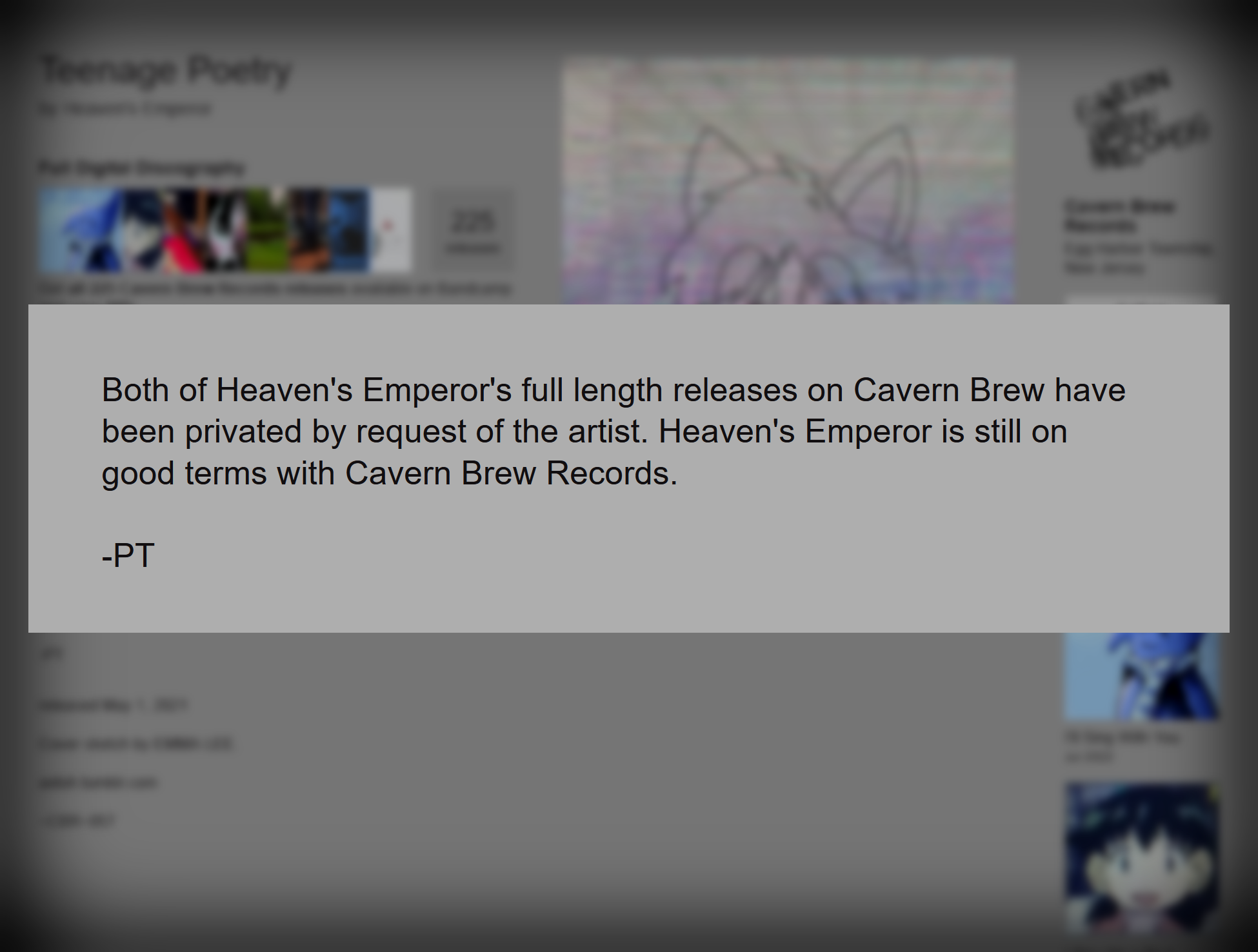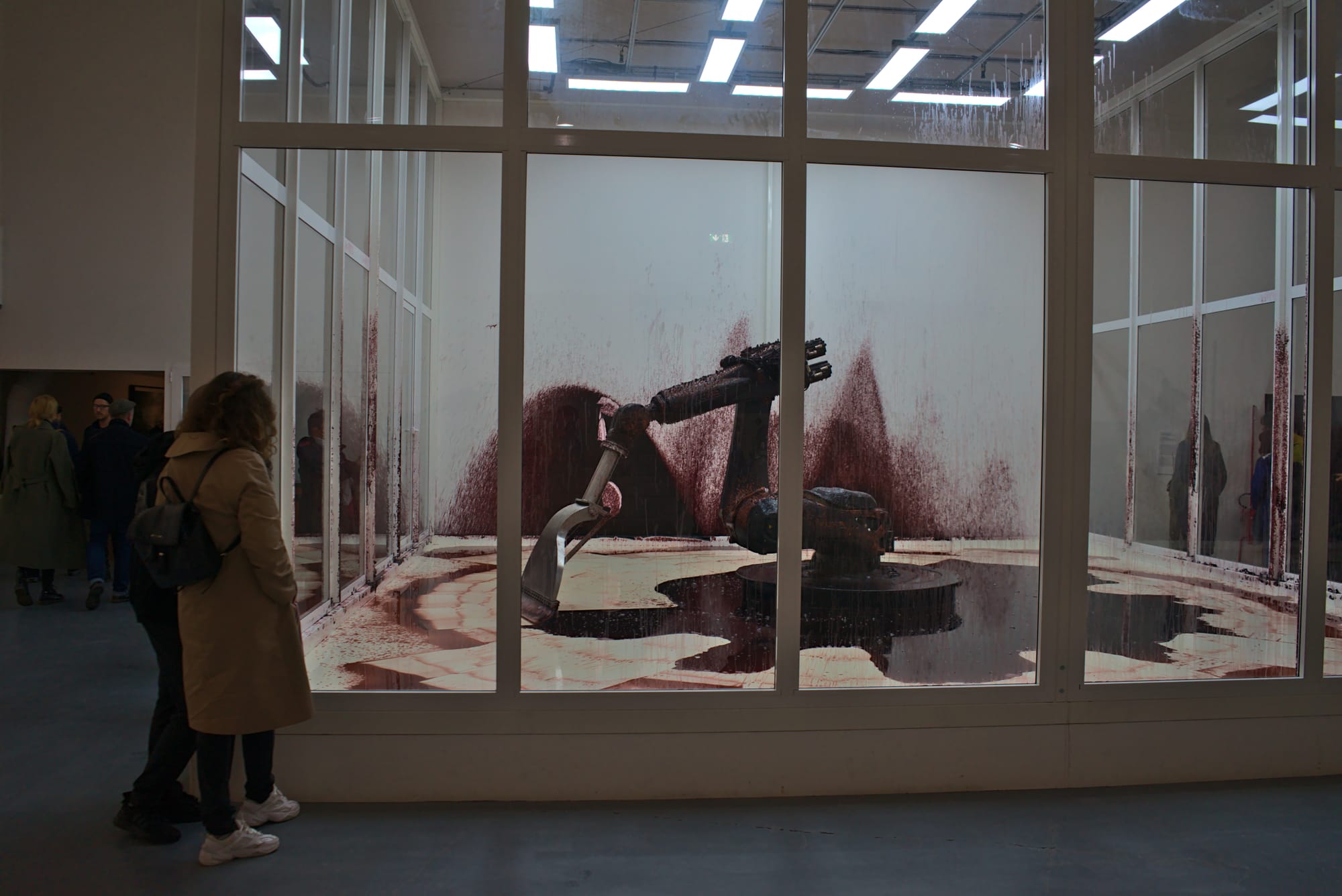'I Was an Ex-Teenager' - An Adult Reconciling with 'Teenage Poetry'
Melissa tackles the gauche subjects surrounding an album that no longer exists*, and why it came to be.
Content warning: This particular article discusses themes of depression, suicide, and queer subjugation, including mentions and deliberations on art where one or more elements utilize depictions of suicide deaths, though nothing is depicted through pictures in this article. Reader discretion is advised.
It's difficult to talk about the work of Heaven's Emperor (who I will hereon refer to as 'Hobbes') for me. Not only is it actively polarizing even in the niche circles it found fandom in, but it is also a body of work that is currently in a state of limbo. A large number of their releases, especially the more infamous ones, are intentionally withdrawn from official sources. While not scrubbed from the internet completely, the removal of their albums made it a discography you'd only find in underground file-sharing networks and unofficial YouTube reuploads. The music, topically, is incredibly personal to the artist, and transgressive in its emotions. It borders on the actively suicidal.
Because of all of these compounding factors, listening to something like Teenage Poetry feels wrong. It barely exists beyond those who care to keep it alive, and it's a window into a stranger's emotional state so vibrant in its depression that bearing witness to it is viscerally uncomfortable. It is for this reason that it's in an assortment of albums that are "artistically gratifying" but so shocking that I can only listen to it in times of particular sadness. I have a history of writing emotionally potent, brash music in much the same way as Hobbes, and then expunging it from public visibility. I know what it is like to not expect an audience to gaze upon your art, much less editorialize it like much of the RYM nerds do.

I've been engaging with my past artistic endeavors for some time now, but never quite stuck a landing that made me comfortable. I restored some art, deleted it again, got asked to put it back up on certain pages, and generally waffled between choosing to leave the trail of my past more or less obvious. In the end I've decided to not acknowledge it explicitly but artistically process the baggage and trauma I have associated with that time in my life. My albums through ambient project nightstand lullaby deal in narrativizing this struggle with my past, about what would happen if I finally attempted to let it go and move on. In this sense, Hobbes and their actions in the public light fundamentally altered how I approached my art through its pure emotional transgressions, putting me on a path of artistic reconsideration, retconning, and eventual healing.
Coming into this state of reappraisal came with extreme growing pains, however. In my journey to become more self-aware, the things I did in my past came back to haunt me obsessively. Whether it was old habits dying hard, people I cut off coming back into the present moment, or slow and painful realizations of the harm I'd done to others, there was a constant sense of pain when examining myself and my situations. A lot of what I did was juvenile, a teenager trying desperately to grow up and understand but refusing to fully cling onto nuanced, adult ideas until very recently. A lot of the art you make when you're a teenager can be embarrassing.
In the online music nerd circles, especially ones where teens like me roamed, there was sometimes an almost pornographic fixation on depressive music. I wasn't exempt. I would constantly peruse lists of disturbing music, music about suicide, and frequently try and filter RYM charts with tags like "depressive, suicide, melancholic". When it was not artists like Duster or Low or Earl Sweatshirt filling that void musically, it was Have a Nice Life or Death Grips searing nihilism into me. I was not blind to the emotional state of Hobbes' music. Even though I'd familiarized myself with a tarpit of musical depression, though, stuff like Teenage Poetry brought that sense of depression to reality.
Teenage Poetry, alongside other works of Hobbes back in their heyday around the late 2010s and early 2020s, utilize the imagery of real suffering, including audio snippets of people having mental breakdowns and, in some cases, people describing their own suicide as it happens to them. The album's visualizer has bookends where it shows the overhead view of a corpse splayed on the ground. These are all innately controversial for spaces outside the realm of goregrind and other particularly extreme music scenes, and is most likely part of why Hobbes' art is hard to find in current day. It is often considered 'in poor taste' to use someone's real death as a vessel for artistic ends unless you have a damn good reason for it.
I'm not going to argue for or against these uses from a moral standpoint, but instead argue that these symbolize something greater than a mere want to sample them for the sake of edgy aesthetic value. It is profoundly "teenage" in a way that very few art elucidates. It speaks to the yearning that teens like me had for any sort of 'true' connection, reaching out in such desperation that things like using the image of a man's suicide seem to be the only way to reach out to somebody about the incredible fear of existence as a queer person. Teenage Poetry is such a profoundly dense artistic statement on feeling stuck in a state of perpetual fear and sorrow that it's voyeuristic, like a snapshot of someone's mental state.
A lot of people seem to take Hobbes' art as a manipulation or fetishization of death (and you can certainly argue it is in part, considering 'Infinite Love EX' samples the immediate minutes after Philando Castille's lynching by police) but do not seek to reckon with why someone would make art in this way. If they do, they often assume intent in a vacuum, attributing malice where there isn't any. It speaks to a growing tendency of audiences to assume that music is a concrete artform with moral obligations and singular interpretations, one where the artist is so heavily tethered to the art that their actions can often act as synecdoche for the art itself.

This bolstering of authorial voice and context suppresses interpretation of art that is not innately tethered to the idea of a singular comprehensive truth. It becomes more about what an album or a show "is trying to say" rather than a dissection of its themes and motifs that attempts to take the art on its own terms. This is not to say that authorial context is inherently negative, but is instead something that has become a quick and sloppy way to "solve" art. Ironically, rejection of authorial context also has the ability to create a new one made by the collective audience of a piece. This is best demonstrated in the Sun Yuan & Peng Yu piece 'Can't Help Myself', where the politically charged subject of militarized borders and automated surveillance are regularly subsumed for the simpler aesthetic tale of nihilistically personifying the robot.
Similarly, Teenage Poetry is an incredibly political album underneath the commonly given pretenses of it simply being an "album about depression". Multiple perspectives are shown in parallel with each other, including news reports of bodies hitting the floor on 9/11 and movie clips about murdering people of the 60s counter-culture. These samples coalesce inside the music's oppressive and distorted mix to create a unique sense of despair. It comes straight off the heels of a politically turbulent time, populist conservative movements dominating much of the headlines in North America as it wrote blank checks to those who stole the lives of innocent people and lobbied against queers.
As time goes by, this multifaceted depiction of terror becomes simultaneously more prescient and more difficult to stomach as the world around us begins to get worse. In current day, Americans (now alongside more and more people globally) are getting stuck with the same populist fascism that rose to power in 2016–arguably bigger and more threatening than before. Trans people in particular are becoming the latest scapegoat for conservatives. As a hispanic trans woman living in Florida, I am constantly afraid to go outside. Sometimes, I have found myself back in the place where I once was as a teen, in a tar pit of my own melancholy and paranoia, wishing to end it all.
I'm an adult now, though. Even as I sometimes explode into bursts of dissociation and panic, I have the advantage of hindsight and a better handle on reconciling with the fucked up world around me. Life isn't easier, it's honestly much harder now, but becoming an adult makes wallowing in your own mental filth less and less of an option as time goes on. Depression feels less safe to stay in, and a lot of things have changed as a result. In the very few times I've felt inclined to listen to Teenage Poetry these past months, they've been punctuated by either incredibly dire depressive episodes or active moments of trauma in my life.
This is not to say that Hobbes' music has become worse, far from it, but it gradually becomes more and more obvious that the seemingly permanent dour nature that this music portrays is not something I can stomach as easily as I could when I was neck-deep in my own mental hell. It is brash and frequently naive, but that's not Hobbes' fault. It's not my fault that I felt scared enough to want to end it all, making art about it constantly and writing suicide notes at the age of 13. That's just how it shook out. It's okay to expunge, it's okay to proliferate it, and it's okay to forgive yourself for all the things you did when you went through it.
I hope wherever they are and whatever they're doing, Hobbes is doing okay.



